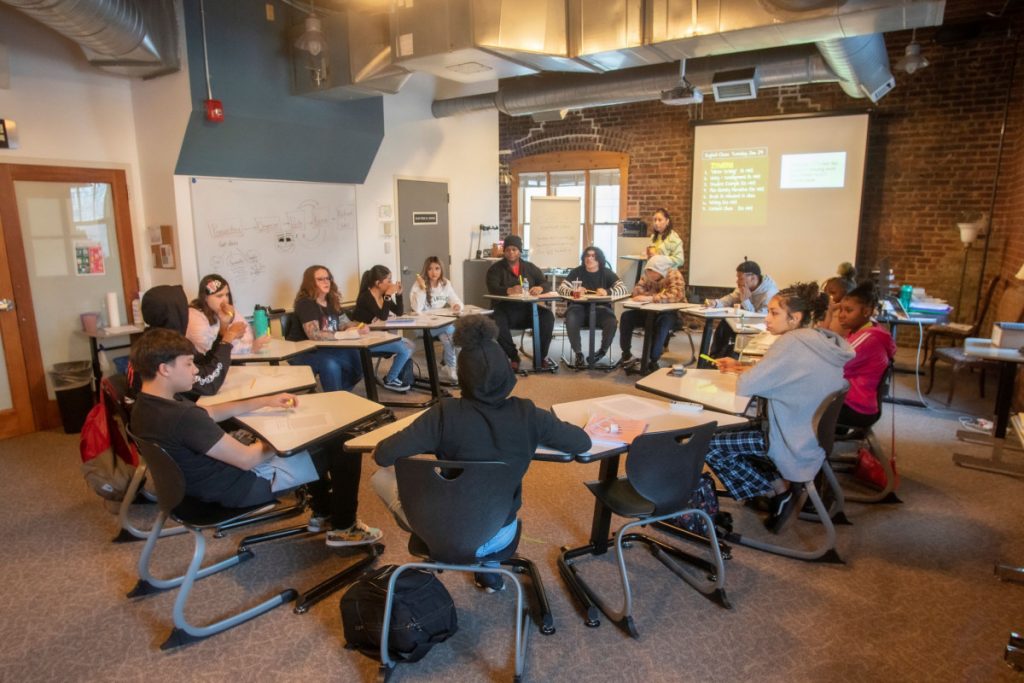It’s becoming clear that Denver will have a 7-0 school board for the second time in recent memory following Tuesday’s election. But this time, it is a complete mirror image of the previous unanimous board.
Candidates backed by the Denver Classroom Teachers Association will, come late this month, hold all seven board seats. What this means for Denver Public Schools will become clearer in the coming weeks and months. But it surely spells trouble for the city’s robust charter sector, as well as for semi-autonomous innovation zones and innovation schools.
One big question is whether anyone can claim a mandate when turnout was so abysmally low. In the citywide at-large race, just 21.5 percent of registered voters cast ballots, according to returns posted at 5 p.m. on Thursday 46 hours after polls closed. That number will climb a bit when final results are released this evening, but that’s a dismal showing.
As vanquished at-large candidate Vernon Jones Jr. posted on Facebook: “No matter the outcome, we must take a hard look at why a majority of people do not feel the need to engage in school board elections.”
Incumbent board member Tay Anderson was having none of that introspection. “Denver voters agree we’re heading in the right direction. We’re poised to have a union super majority on the Denver School Board,” he Tweeted.
Note his use of the term “union super majority.” If anyone has any doubts about who is driving the agenda, let that Tweet put those doubts to rest.
Mandate or not, those who voted decided, by wide margins in central Denver and citywide, and narrow margins in the southwest and northeast, that steering DPS in a more progressive direction is what the school board should do.
Why did people vote this way? Did they like what they saw from the current board, which has had moments of dysfunction and in-fighting, muddled through pandemic disruptions, and drove out a superintendent of color who had been a career district employee?
Did voters approve of removing police officers –”school resource officers” in educational jargon — from schools? Did they support the squeeze the current board put on even high-performing charter schools? Did issues like the introduction of non-gender-specific bathrooms in schools sway a large number of people?
Perhaps, perhaps not. I have another theory. In an environment where school board races draw little attention, and where the number of credible reporters covering education has dwindled, the vast majority of voters know little to nothing about candidates and issues.
I tip my hat to the DCTA for its effective canvassing tactics. The union turned out teachers to ring doorbells across the city. Never underestimate the power of a teacher knocking on someone’s door and saying “these are the candidates who support kids, teachers, and public schools. Please vote for them.”
If you’re a resident who doesn’t pay much attention to school district politics or policies, just that outreach is going to be persuasive.
Independent Expenditure Committees backing the non-union candidates significantly outspent their rivals this year, as they have in other recent election cycles. Just as in 2019, however, they came away with three losses. Perhaps it’s time to rethink strategy. Money apparently does not talk in these races. And paid canvassers cannot compete with teachers knocking on doors.
So, what’s next? Denver Public Schools are facing several years of declining enrollment. Another 1,000 K-12 students left the district between last school year and this one. That’s a 5,000 student drop since 2014.
Look for the new school board to do everything in its power to stop the growth of the charter sector, and to deny renewal applications for existing charters, in an attempt to regain market share.
In a similar vein, thriving innovation zones made up of district schools, and some of which are run by autonomous nonprofit boards, face an existential threat. The Denver Classroom Teachers Association dislikes the zones, and therefore the board is likely to take them on aggressively.
Denver’s unified enrollment system, which makes it easier for parents to enroll their children in charters, is under threat, as is the district’s student-based budgeting system. To the extent that the district can curtail state tests, it will do so. Dismissing ineffective teachers will become more difficult.
Superintendent Alex Marrero is likely to face stiff challenges, as an assertive board attempts to set the agenda. While the current board has given a great deal of lip-service to the concept of policy governance, it is hard to imagine the ideologues on this new board allowing Marrero the freedom to lead the district effectively.
If the previous board had a tendency to micro-manage, look for that problem to grow worse with the new board.
A 7-0 board can move fast if it holds together. Will the forces who were routed this week be able to regroup and develop effective counter-strategies? Time will tell.




